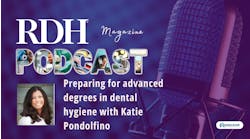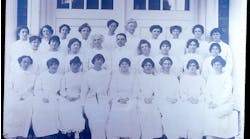I am in my seventh year with the college, and I can still say that I am very much looking forward to next year's crop of dental hygiene students and showing them which end is the working end of the instruments.
Every month in RDH, I read about how other hygienists are branching out into different areas and bringing new enthusiasm to their careers. I, too, have branched out and thought to share my story for those of you who may be looking to revitalize your own career.
I graduated from dental hygiene school in 1984. After practicing for 16 years, I found that I still love my work, but, like many of my colleagues, I felt I needed something more. At first, I thought about teaching. As I thought about it, I wasn't sure if I would feel comfortable teaching classes such as dental materials and anatomy. When I took the classes as a student, I easily passed them. However, I wasn't sure about teaching them. Not only that, I was not qualified to teach them.
I thought next about being a part-time clinical instructor. Now that, I knew I could do. I contacted a local college with a dental hygiene program and, sure enough, Wayne County Community College needed part-time clinical instructors. I learned that part-time clinical instructors are almost always needed. Although full-time instructors are busy doing all they can, the students still need more instructors to check their work in clinic. I am now in clinic four to eight hours a week and find that I get more out of it than the students do! It is fun to be around such enthusiasm. I had forgotten what it was like to sweat when an instructor came over to check your work. I found the students to be friendly, nervous, and, most of all, willing to learn from me.
The college where I teach believes in teaching at the chair, and I share that belief. I enjoy the hands-on approach to teaching my students the skills that I have been developing over the years. I can easily see why the calculus isn't coming off for some of my students just by the way they hold their instruments.
But the students learn more from me than just how to properly hold their instruments; they learn patient management and professionalism. Since each instructor has a different personality, the students learn some very important communication skills.
For those few hours each week, I find the classroom setting an inviting deviation from private practice. The exposure to colleagues who are not co-workers also is a nice change. You seem to have more in common with them than you would think — the common goal of wanting to help students succeed. I also find it fulfilling when I run into former students at seminars and dental conventions, and I hear about how well they like their careers. We remember the "old days" in clinic and always have a good laugh.
Would this be something for you? Ask yourself some of the following questions. Is patience one of your virtues? Some of your students will be in clinic for the first time and will need a lot of help. They'll be nervous and will need much encouragement.
You have to figure out what to say, how much to say, and to whom you should say it. Can you offer constructive criticism? You have to focus on how well they removed calculus from the posterior of the mandible and, at the same time, help them with how to remove calculus from the maxilla, which were missed. Can you answer the same questions again and again? "Ms. Chandler, can you tell me again which end is the working end of this instrument?" "Ms. Chandler, what can I do if my patient doesn't show?"
Are you willing to accept the dress code of a college setting? This means no nails that can be seen when looking at the palm of your hand, no nail polish, etc.
There is a down side to this possibility, and I don't think it would be fair not to mention it. Because the hours usually change with each semester, you must have a very flexible work schedule in your private practice and be willing to work some late hours, if needed. For example, at Wayne County Community College, first-year dental hygiene students are not in clinic in the fall but they are in the spring. Then, both first- and second-year students are in clinic, and the demand on your time will be greater. Also, the clinic hours are from 9 a.m. to 9 p.m. On those days when you work almost a full day in private practice, it is hard to go and work another shift. On those long days in particular, you must still be able to be objective and treat every student as fairly as possible, and that can be very hard to do.
For me, working as a part-time clinical instructor has been the answer to what was becoming a classic case of burnout. I am in my seventh year with the college, and I can still say that I am very much looking forward to next year's crop of dental hygiene students and showing them which end is the working end of the instruments.
Diane Chandler, RDH, is a first time contributor to RDH. She has practiced dental hygiene in the same dental office for 16 years. Once a year during dental awareness month, she provides a dental information program to her community through their public access cable network.





